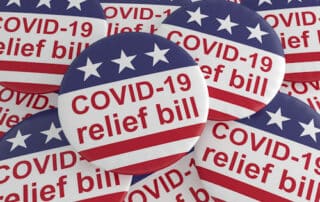The American Rescue Plan Act of 2021, commonly known as the COVID Relief Bill, became law on March 11, 2021. The law includes the widely publicized $1,400.00 stimulus checks and expanding vaccine distribution, in addition to increasing access to health insurance, funding for the long-term care community, and continued support for the Elder Justice and Older Americans Acts.
For those on Medicaid, the the COVID Relief Bill stimulus check is not income or a resource for Medicaid purposes. The funds may be gifted penalty-free for the first 12 months. After 12 months, it is considered a resource impacting Medicaid eligibility. Our advice: Medicaid recipients should spend or gift the stimulus payment within a year of receipt.
If an individual dies in the year 2021, the individual still qualifies for the $1,400.00 stimulus checks even if the individual died prior to the legislation’s passing on March 11. Those who died in the year 2020 are not eligible for the $1,400.0 payment with one exception. For couples filing jointly where the deceased spouse died in 2020 and was on active duty in the military in 2020, the surviving spouse will receive $2,800.00, each spouse’s stimulus payment. For those who receive the check in error, the IRS provides detailed instructions on the check’s return.
The Act’s scope extends beyond the economic stimulus checks. Highlights of the legislation’s impact on the long-term care industry includes $450 million in funding for:
-
- Quality Improvement Organizations to assist nursing homes with the vaccination process and infection control, and
- Statewide Strike Teams to respond to COVID-19 outbreaks by helping with staffing, infection control, and resident care.
The the COVID Relief Bill also aims to increase access to health insurance and expand coverage through targeted funding to ACA Marketplace, COBRA, and Medicaid. More specifically,
-
- for those who receive coverage through the Marketplace, premiums will be eliminated, reduced, or adjusted based on the insured’s income; and
- COBRA recipients will have their premiums subsidized for six months if they are receiving COBRA due to job loss or a reduction in hours.
Medicaid is given a boost through additional funding. The federal match for Home and Community Based Services (HCBS) is increasing by 10%, and states that have not expanded Medicaid under the ACA now have more financial incentives to do so.
Finally, the COVID Relief Bill provides increased financial support for two Acts dedicated to the safety and welfare of seniors – The Elder Justice Act (EJA) and the Older Americans Act (OAA). Signed into law in 1965, the OAA is the foundation of the aging network supporting many seniors. Home-delivered meals, the long-term care ombudsman program, and the national family caregiver program are just a few of the initiatives created through OOA funding. The Rescue Plan includes $1.434 billion in funding for OAA programs. Similarly, EJA projects will receive $276 million per year over two years. The EJA was established in 2010 to support and further programs addressing the abuse and exploitation of seniors, including adult protective services.
More information on the COVID Relief Bill’s impact on seniors and access to health insurance may be found:


